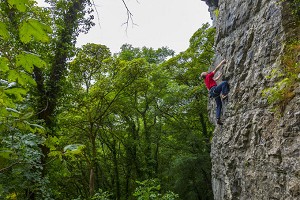
Molly Thompson-Smith (20) is celebrating her most successful year yet, culminating in a bronze medal in the final round of the IFSC Lead World Cup in Kranj, Slovenia last month and a World Ranking of 7th place in the series overall. Having excelled at junior level - with a European Youth Cup win in 2014 and multiple British titles - Molly has seemingly made the daunting transition to international senior lead events with an ease that eludes many a seasoned youth competitor.
However, Molly's rise up the rankings hasn't come without many hours of dedicated training and significant changes to her lifestyle and career path. Following a bout of uncertainty at the end of her junior career, Molly wasn't sure about continuing along the same competitive route. Fortunately, a well-deserved break allowed for some time to reflect and recharge before making her remarkable comeback this season.
I think this year was the first year where I actually believed I deserved to be at the World Cups; being good at a junior level means little as soon as you step into a senior event.
I spoke to Molly about her gap year, moving to Sheffield and swapping uni for the circuit board (for now at least) with the support of an exciting sports scholarship...
You took a year out to travel after finishing your junior career before you expected to head to university. You have mentioned feeling unsure about returning to compete at senior level at this point. What caused you to feel this way, and what happened in your gap year that changed your attitude?
I had put everything into the second half of 2016; I changed the way I trained with a new coach, focused on diet and trained solely in the hope of a strong end to my junior career. Despite all the hard work, and some decent results (3rd EYBCH & 9th in Lead and Boulder WYCCH) I was still disappointed - I believed my results at the WYCH didn't reflect the progress I'd made and so feeling a little defeated, I decided 2017 was going to be a break from comps. It didn't take long to realise that I didn't really want to be away from January until August, and I spent the first few months watching my competitors' training videos on Instagram, wishing I was back training for the comps. Eventually, I decided it was worth going home rather than trying to carry on travelling and not fully enjoying it. I was pretty anxious before the first comp in Italy, the European Championships. I wanted a good result to prove to myself that I'd made the right decision to come home and that it was worth committing to the comps! But this season has been incredible and really motivated me to continue to fully commit to competition climbing.
You had plans to go to university after your gap year. Is this still in the pipeline for you? At what point did you realise that it could be worthwhile delaying your entry or not going to university to focus on your climbing career? Tell us about the Sky Scholar programme - in what ways will it help you?
Thanks to the Sky Sports Scholarship programme I'm able to train and compete full time - something I didn't think I'd be able to do, especially so early on in my climbing journey! When I found out I had achieved a place on the programme I decided it would be kind of silly not to make the most of this opportunity and to continue juggling multiple things at once. I had always wanted to see where I could take my climbing if I was able to focus on it without interruptions from school or having a job, and now that I have the support to live the life of a professional athlete I'm trying to give it my all. The Sky Scholarships programme will of course support me financially, but also provide media training, mentors, academic assignments and feedback, and plenty of opportunities to promote myself. This will be helpful in the run up to 2020 as climbing gets more attention and will make me a better and more rounded professional athlete. I hope to start studying after the Olympics... maybe by then I'll know what I really want to study!
You are living in Sheffield now. It seems like a lot of the strong youth climbers have migrated to Sheffield for university and training. How would you describe the scene there? Is it much different to the London scene you grew up in, which also has a strong training scene?
I moved to Sheffield for how easy it is to train here; I'm much closer to my coaches in Leeds, and have four (soon to be five) walls for training in Sheffield alone, with a few more within an hour and a half's drive, and of course the proximity to the Peak District is great. I think the scene is obviously much more rock focused, with the Peak being on Sheffield's doorstep, and also more goals focused - everyone is always training for something! Sometimes I feel that some (not all!) people in London train just for the sake of training, which is fine, but up here people have projects outside they're training for and have a much more dedicated attitude. There's also a much bigger scene for younger climbers up here, and with the walls being so spread out in London, and people being loyal to their chosen facility, it can be quite hard to meet climbers my age. Up here there are more young people psyched to train and keen to get into the competition scene. I'm also starting to get outside more when I can, which is always a welcome break from training in the gym and the stress of competitions!
I find more satisfaction in climbing things outside - they weren't manufactured to be climbed, it's all natural and an achievement if you can find a way to make it work.
You had previously competed in a few World Cups at senior level and placed well, but what has made the biggest difference this season? It's clearly a physical improvement, but I imagine you have worked hard on your mental approach to the competitions, too?
I think this year was the first year where I actually believed I deserved to be at the World Cups; being good at a junior level means little as soon as you step into a senior event. In the past I struggled with confidence issues and used the competitions for 'experience', which I think was an excuse for me to not 'fail' as such in the competitions. This year, despite having a rushed pre-season training period, I decided I was going to train for the competitions as hard as I could, eat well, sleep well and be as professional as possible. My training got a lot harder compared to last year and maybe that had some impact, but I do think confidence has helped me out massively this year. I think next year the mental aspect of competitions will be just as, if not more important as I have some expectations of myself and more pressure to try and follow this year's great season.
Your Dad is a former professional football player and is currently involved in football coaching. How has his approach to sport and training influenced your climbing career, with his outside perspective from a mainstream sport?
My dad has always encouraged me to do my best in anything I tried to do - that was good enough for him. He always wanted me to be successful but never pushed me to do anything I didn't really want to do. Yeah, there were times where he encouraged me to do an interview or presentation (I hate public speaking!) I really didn't want to do, but I always knew that he wanted the best for me and was only trying to help me achieve what I wanted, which was to be a professional athlete, and that I'd have to do things that made me uncomfortable for that. I'll be forever grateful for all the hours he's spent sat waiting at a climbing wall, or listening to me rehearse a talk or practise for an interview, or just generally travelling the country and world to help me do what I love! For my dad, and for me, sport is sport and whichever one you choose to do you should put all your efforts into it.
Your results seemed to improve with every round this year, culminating in a Bronze at Kranj. What were you learning after each round to take on to the next?
I was realising that although success in the World Cups is difficult, it's not impossible like I once believed. At each round I was excited to improve, but also frustrated to be so close yet again, or feel like I could've done more. Mostly I just couldn't wait to have another opportunity to try and improve on the previous competition. This year I had really good momentum, getting more confident, and feeling better prepared after each round, which made the season much less mentally taxing. Last year I had some tough competitions and it felt really hard to motivate myself to compete at the next and try as hard as I could in it. My goal for this year was to achieve a top 10 placing in a World Cup, so after an 11th place at my first World Cup of the season I was incredibly psyched to try and push into the top 10. Standing on the podium wasn't a goal of mine for some time so to get a bronze medal in Kranj was pretty unbelievable.
You redpointed Mecca 8b+ at Raven Tor shortly before heading to Kranj. Did you enjoy the process of working it? Did it complement your indoor training, would you say? Is outdoor climbing something you'd like to incorporate more into your training now you're in Sheffield?
Mecca was a great way for me to stay motivated between the China and Kranj World Cups. After China I was so exhausted and just wanted it to be the end of the season so I could rest and enjoy climbing outside, so getting on Mecca between training sessions helped me keep going. The powerful moves were good practice for the style of Kranj too, so every time I tried it felt like training too! I think having a project outside gives me another reason to train hard and also keeps it fun - comps can wear you down, so having something you really want to be fit for helps keep the psyche high. I've started having a potter on the grit whenever I can between sessions, which breaks up my training and allows me to spend some time outside, which I find helpful for staying healthy and happy during the cold and dark winter months.
You returned to China for the China Open just after Kranj. How did that go? You described feeling exhausted after the event. How do you ensure that you keep fit and healthy between the travelling and disruption of competition?
The China Open was a little bit of a disappointment for me; after such a good comp in Kranj the weekend before, I had fairly high expectations for this one. I think my head was so exhausted from having to 'keep it together' and focus throughout the season that it just decided it had had enough as I pulled onto the final route! However, the boulder competition was a much more enjoyable experience and I had a lot of fun in finals feeling like an odd one out amongst some strong boulderers!
Travelling lots for competitions definitely makes them harder - this year was my first China Tour and after two weeks I felt pretty broken. The change in normal diet (where are the fresh veggies?!), sleep disruption, weird humid climate, language/culture barriers and never feeling settled make it all quite a tough one. Diet and sleep are important for me to try and stay healthy between comps, and I try to do as little travelling as possible when I don't have to as even a day on a plane sat doing nothing, or a long drive feels harder than a training day to me!
I know that you describe yourself as a very competitive person and that you 'want to be the best'. Does this extend to outdoor climbing too? How different does it feel when you climb outside compared to in a competition, in terms of your self-motivation and enjoyment of climbing? People talk about getting used to reading rock and 'being in the outdoors' etc, but perhaps the differences run deeper than that? (I think so for me personally, anyway!)
I find climbing outside pretty difficult - some people can just read a rock face like a book but for me I need clear descriptions of the holds on a route for it to make sense in my head! Growing up in the gym where I just had to follow a line of blobs probably made me pretty lazy, so finding holds and reading rock is something that slows me down and has always pushed me away from climbing outside a lot or trying hard things. In comps I want to beat other people - that's kind of the point of them, but on rock I just want to prove to myself that I can do it, and climb as many lines as possible. I do love climbing on rock, but I like doing things quickly so find it frustrating. There's so much subtlety to it, especially with gritstone; you can't just be strong, you have to feel the moves and actually climb the problems. I find more satisfaction in climbing things outside - they weren't manufactured to be climbed, it's all natural and an achievement if you can find a way to make it work.
This year three GB women have made IFSC Lead World Cup finals - you, Hannah Slaney and Shauna Coxsey. The men have also seen some great results, with Jim Pope placing well in semis. What do you think has caused this improvement, in a discipline in which we've been generally underperforming (compared to the bouldering events) over the years? It has often seemed like competitive lead climbing has some sort of 'image problem' in the UK compared to bouldering - it's slower, not as entertaining, some say, and we have a rich history of bouldering success in both comps and on rock. Is the bouldery/volume-heavy nature of modern routesetting helping us Brits to do better now or is it simply a matter of improved training approach and confidence, etc.?
I think having a group of athletes that actually felt a bit like a 'team' again has helped a lot. Hannah, Jim and I all have the same coaches and we sometimes get to train together, but have also been competing together for years on the junior team. Going to comps with other people who are there to support you too makes them much more comfortable and enjoyable, and I think especially in the senior circuit, the better you feel at a comp, the more likely you are to perform as well as you can. As well as this we've all really stepped up our training this year, and I certainly decided that I wanted to have a good season and focus fully on the lead, which no one has ever really done before. Bouldering has been the favourite for a number of years now and I think our success in that discipline has inspired young people to venture more into competitive bouldering and lead has taken a back seat, but hopefully now that people have seen GB athletes doing better and better in the lead WCs, and can understand the level a bit better, there'll be more interest.
I think the way routes are heading is definitely in the right direction for us Brits, with more powerful and bouldery moves being the norm and tick-tacky sustained climbing falling out of fashion. You can see how - especially in the women's event - strength and power is starting to trump just being able to hang on to crimps for forever! With such a proud board climbing and strength training background here, it's a big advantage for adapting to the new style of setting.
You are also a strong boulderer and competed in the BBCs and the World Cup in Munich this year. Will you be taking part in more boulder World Cups ahead of the Olympics?
I'll definitely start to enter some more boulder competitions to get a feel for how they work, the setting etc. Experience is such a key part in being a successful competition boulderer, so I'd like to try and gain some more understanding and skills and hopefully improve in that discipline of climbing too. My main goal in climbing is to try and be an all-rounder, so the Olympic format is a great excuse to try and get closer to achieving this goal, and I'll find it worthwhile whether or not I qualify for the Olympics, or ever have a good bouldering competition.
What about speed climbing - does it feature in your training yet? How do you feel about the Olympic combined format?
I haven't yet put any time into speed climbing, but it's something I will be throwing in here and there. I think I'd rather focus on my lead and bouldering, but learning some of the skills required to be good at speed will be beneficial to my climbing in general. It's exciting that climbing has the opportunity to be a part of such a prestigious event, but I do think it's a shame we can't have medallists in each discipline. The proposed format may lose some of the best athletes in certain disciplines as their performance in other disciplines isn't strong enough to see them through the selection stages. For example, if the Olympic speed record were to be much slower than the World Record because the World no.1 speed climber wasn't a good enough boulderer or lead climber, then that wouldn't showcase the best talents of our sport which is disappointing.
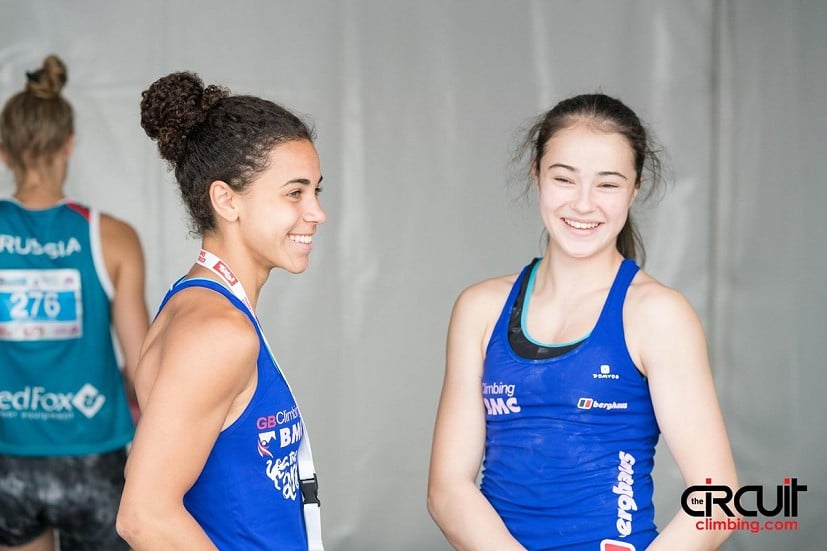
As someone who is not too long out of the juniors, what changes do you see happening in the GB youth teams since the Olympic announcement? Are young climbers choosing to diversify ahead of Tokyo 2020? Are they following strict training programmes with coaches?
There's been a shift in focus to the youth team being combined athletes and training for all three disciplines. The latest development squad selection event saw all the kids competing in an event similar to the proposed Olympic format. I think a lot of young GB climbers would like to go for Tokyo 2020, and have all started training for it already by travelling up or down the country to train on the speed route, or entering national comps in their non-preferred discipline.
I think the way routes are heading is definitely in the right direction for us Brits, with more powerful and bouldery moves being the norm and tick-tacky sustained climbing falling out of fashion.
New bouldering facilities are popping up all over the UK, but there are relatively few performance centres dedicated to lead climbing. Do you think this needs to change, or are lead climbers adapting their training to circuit boards and power endurance sessions on the boulders? How much time do you spend on a lead wall?
It's a shame to not have an abundance of lead walls like we do boulder walls, but I do most of my training on a circuit board or boulder wall anyway, so it's not too much of a problem. With the change in styles (particularly for the females), and with the increasing number of boulderers entering the lead comps, I think being strong and powerful is just as important, if not more important than having bags of endurance. However, I do value the importance of feeling comfortable on a rope and getting used to the kind of pump you get from hard competition routes, which is why I still like to aim for one route session per week.
What are your goals for next year?
Next year I'd like to have a good overall ranking for the Lead World Cup season, and enter the odd boulder comp here and there. I'd still like to focus on lead for the time being, but also put some work in for speed and boulder too, just not take it too seriously yet. I always have a goal to get outside more but it becomes more difficult the more committed I become to the World Cup circuit. Fortunately, the 2018 season finishes a little earlier so I hope to have time to focus on some rock orientated goals at the end of next year.
- INTERVIEW: Albert Ok - The Speed Climbing Coach with a Global Athlete Team 17 Apr
- SKILLS: Top 10 Tips for Making the Move from Indoor to Outdoor Bouldering 24 Jan
- ARTICLE: International Mountain Day 2023 - Mountains & Climate Science at COP28 11 Dec, 2023
- ARTICLE: Did Downclimbing Apes help Evolve our Ultra-Mobile Human Arms? 5 Dec, 2023
- ARTICLE: Dàna - Scotland's Wild Places: Scottish Climbing on the BBC 10 Nov, 2023
- INTERVIEW: Loki's Mischief: Leo Houlding on his Return to Mount Asgard 23 Oct, 2023
- INTERVIEW: BMC CEO Paul Davies on GB Climbing 24 Aug, 2023
- ARTICLE: Paris 2024 Olympic Games: Sport Climbing Qualification and Scoring Explainer 26 Jul, 2023
- INTERVIEW: Malcolm Bass on Life after Stroke 8 Jun, 2023
- ARTICLE: Alexandr Zakolodniy - A Climbing Hero of Ukraine 26 Apr, 2023



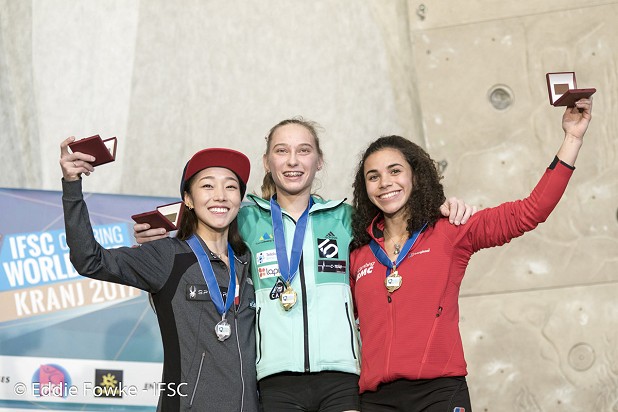
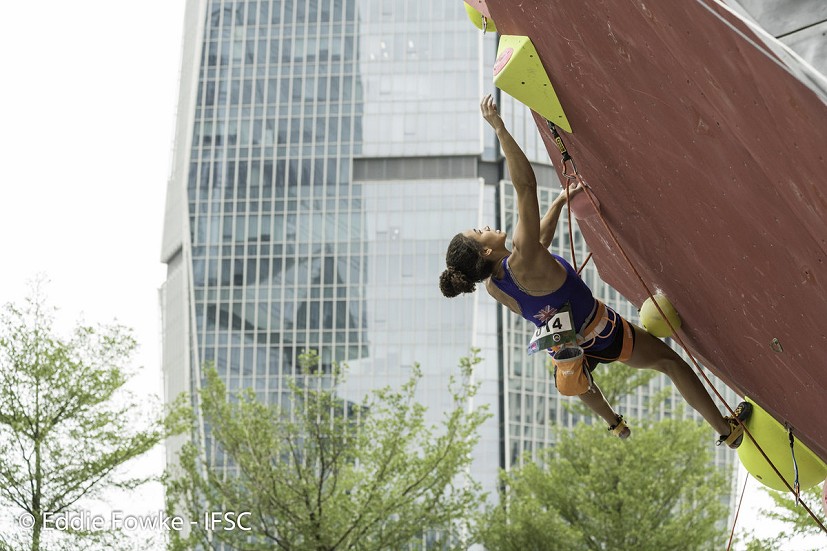
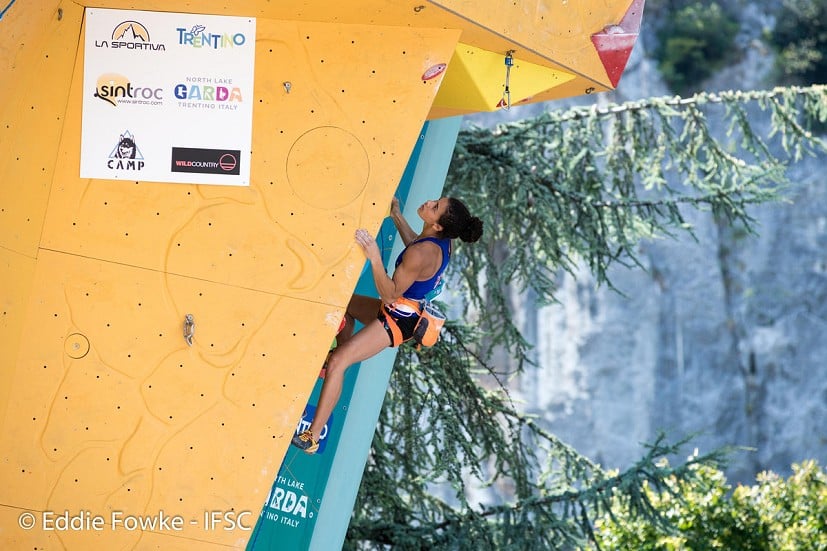
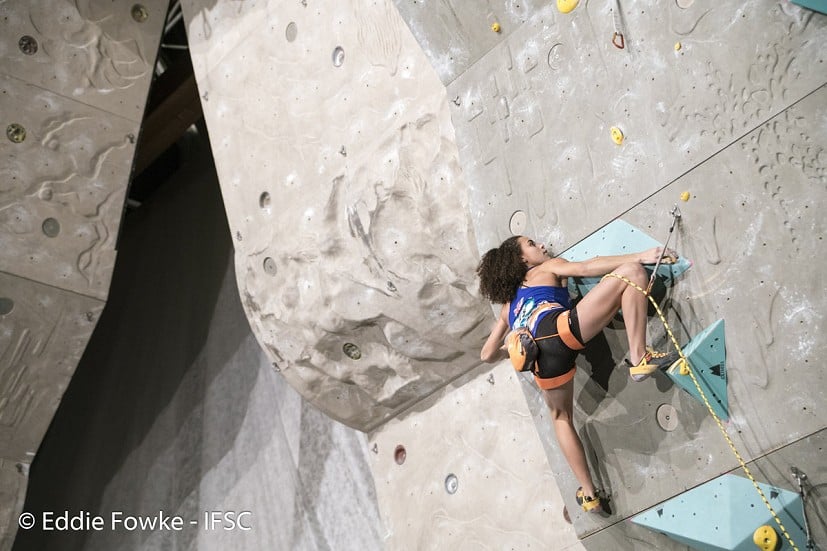
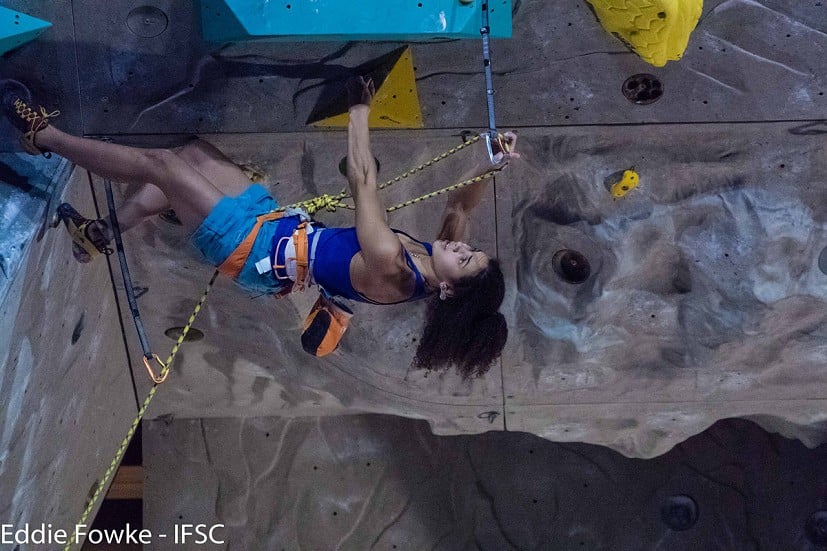
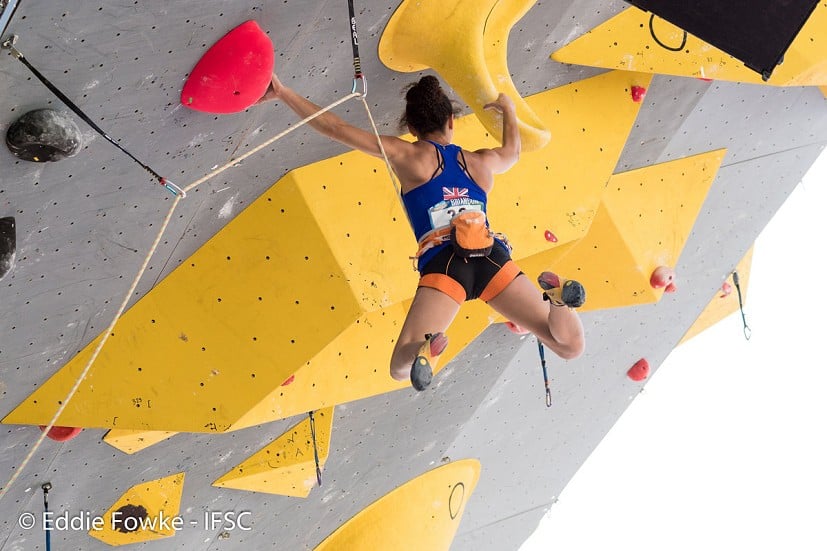
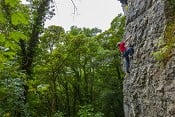
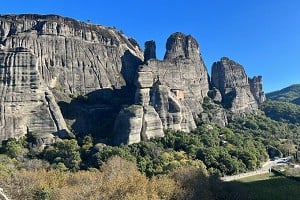

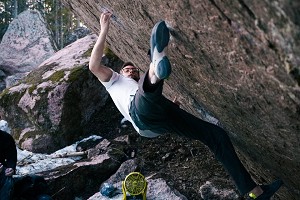
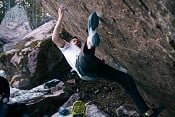








Comments